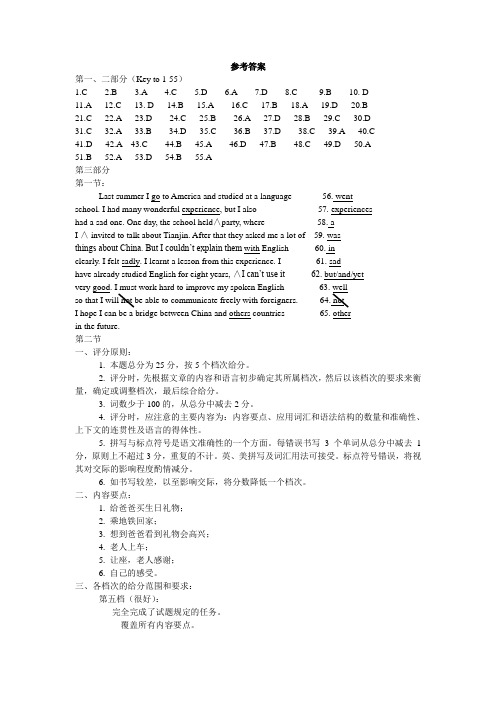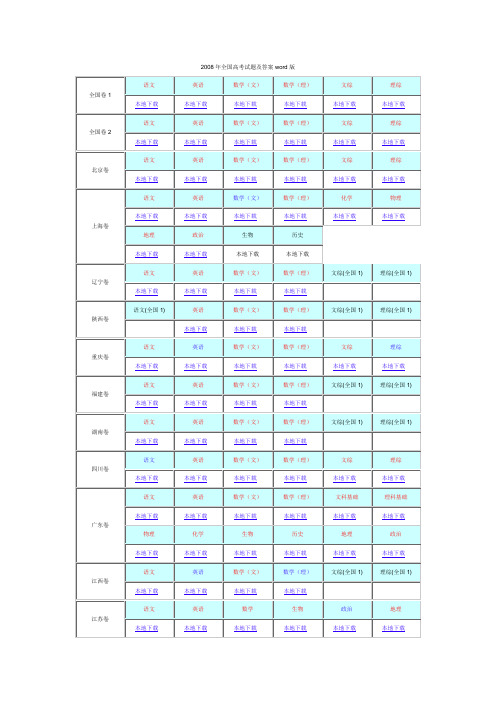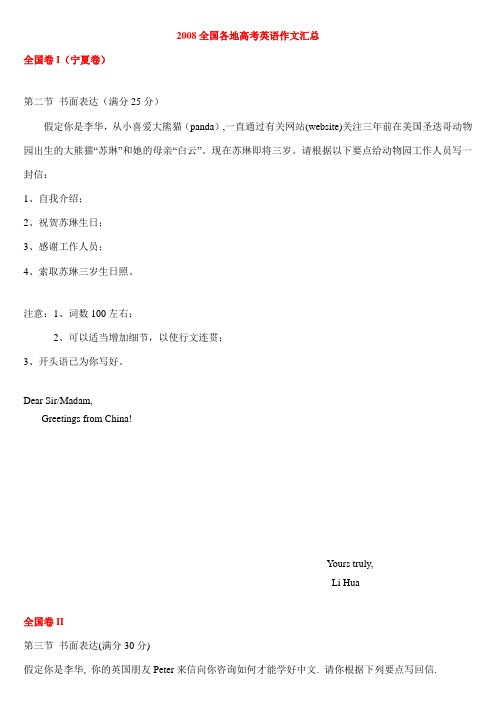2008年高考英语试题-宁夏卷[word
2008年高考—英语(天津卷)Word版含答案

参考答案第一、二部分(Key to 1-55)1.C2.B3.A4.C5.D6.A7.D8.C9.B 10. D11.A 12.C 13. D 14.B 15.A 16.C 17.B 18.A 19.D 20.B21.C 22.A 23.D 24.C 25.B 26.A 27.D 28.B 29.C 30.D31.C 32.A 33.B 34.D 35.C 36.B 37.D 38.C 39.A 40.C41.D 42.A 43.C 44.B 45.A 46.D 47.B 48.C 49.D 50.A51.B 52.A 53.D 54.B 55.A第三部分第一节:Last summer I go to America and studied at a language 56. wentschool. I had many wonderful experience, but I also 57. experienceshad a sad one. One day, the school held∧party, where 58. aI ∧ invited to talk about Tianjin. After that they asked me a lot of 59. wasthings about China. But I couldn’t explain them with English 60. inclearly. I felt sadly. I learnt a lesson from this experience. I 61. sadhave already studied English for eight years, ∧I can’t use it 62. but/and/yetvery good. I must work hard to improve my spoken Englishso that I will not be able to communicate freely with foreigners.I hope I can be a bridge between China and others countries 65. otherin the future.第二节一、评分原则:1. 本题总分为25分,按5个档次给分。
2008年高考英语全国卷【2】word版分析

2008全国高考英语II(不含听力)试题特色剖析贵州省瓮安中学石世学2008年全国高考已经结束,就今年全国高考英语不含听力卷试题设计及试题整体所体现的典型特色,我们就此作一个剖析及归纳。
就试题总体而言,全国卷II的英语试题体现出难易梯度搭配适度,试题结构科学,考查范围涵盖面广。
下面我们来看看考查的具体情况:一、语音知识语音知识的五小题中,分别按照这样的规律来设计试题:a)元音+辅音字母组合一个小题;考查our组合:course A. journey B. four C. labour D. hour。
b)元音字母读音一个小题:具体考查了字母a的读音:match A. separate B. marry C. machine D. many; c)辅音字母读音一个小题,具体考查了s的读音:rise A. purse B. else C. praise D. mouse ; d)辅音+辅音字母组合。
具体考查了th组合读音:bathe A. faith B. cloth C. maths D. smooth ; e)元音+元音字母组合。
具体考查了ai字母组合读音:Britain A. certain B. train C. against D. contain。
从试题设计规律不难看出:5个小题中全部涵盖:1、元音字母读音;2、辅音字母读音;3、元音+辅音字母读音组合;4、元音+元音字母读音组合;5、辅音+辅音字母读音组合。
最近几年高考试题设计思路均是围绕了这样一个原则,而今年这道大题,又是整体涵盖比较完善和科学的。
在选词方面,注重了基础词汇和辨音较为明显的词汇。
所以,总体易于辨析出答案:1、B;2、B;3、C;4、D;5、A。
二、语法和词汇知识语法及词汇知识考查方面,各小题分别考查到如下的要点:1、交际用语:在第6和第10小题中体现,考查到:(第6小题):I’m afraid not (恐怕不知道呢!),该答案B的判断要根据整个对话的后面句:I don’t know any Anna, either;还考查到(第10小题):go ahead (行的,问吧!)答案选B。
2008年全国统一高考英语试卷(全国卷Ⅰ)(含解析版)

2008年全国统一高考英语试卷(全国卷I)第二部分英语知识运用(共两节,满分45分)第一节单项填空(共15小题;每小题1分,满分15分)从A、B、C、D四个选项中,选出可以填入空白处的最佳选项,并在答题卡上将该项涂黑。
例: We ______ last night, but we went to the concert instead.A. must have studiedB. might studyC. should have studiedD. would study答案是C.21. — Would you like to join me for a quick lunch before class?— ______, but I promised Nancy to go out with her.A. I’d like toB. I like it.C. I don’tD. I will22. — What fruit is in season now? — Pears and apples, ______.A. I knowB. I thinkC. I seeD. I feel23. The performance _______ nearly three hours, but few people left the theatre early.A. coveredB. reachedC. playedD. lasted24. Let’s learn to use the problem we are facing ________ a s tepping-stone to future success.A. toB. forC. asD. by25. The lawyer seldom wears anything other than a suit __________the season.A. whateverB. whereverC. wheneverD. however26. I like getting up very early in summer. The morning air is so good _________.A. to be breathedB. to breatheC. breathingD. being breathed27. — Have you known Dr. Jackson for a long time?— Yes, since she________ the Chinese Society.A. has joinedB. joinsC. had joinedD. joined28. You are driving too fast. Can you drive_________?A. more slowly a bitB. slowly a bit moreC. a bit more slowlyD. slowly more bit29. The wet weather will continue tomorrow when a cold front ______ to arrive.A. is expectedB. is expectingC. expectsD. will be expected30. — Which of the two computer games did you prefer?—Actually I didn’t like ______.A. both of themB. either of themC. none of themD. neither of them31. — Have you got any idea for the summer vacation?—I don’t mind where we go ______ there’s sun, sea and beach.A. as ifB. as long asC. now thatD. in order that32. The weather was ______ cold that I didn’t like to leave my room.A. reallyB. suchC. tooD. so33. The English spoken in the United States is only slightly different from ______ spoken in England.A. whichB. whatC. thatD. the one34. After studying in a medical college for five years, Jane ______ her job as a doctor in the countryside.A. set outB. took overC. took upD. set up35. — Sorry, I made a mistake again. —______. Practice more and you’ll succeed.A. Never mindB. Certainly notC. Not at allD. Don’t mention it第二节完形填空(共20小题,每题1.5分,共30分)阅读下面短文,撑握其大意,然后从36—55各题所给的四个选项(A、B、C和D)中,选出最佳选项,并在答题卡上将该项涂黑。
1998-2008高考英语阅读理解真题汇编及详解(人物传记类)

第1题(2007年普通高等学校夏季招生考试英语(全国Ⅰ)DAnyone who cares about what schools and colleges teach and how their students learn will be interested in the memoir(回忆录)of Ralph W. Tyler, who is one of the most famous men in American education.Born in Chicago in 1902, brought up and schooled in Nebraska, the 19-year-old college graduate Ralph Tyler became hooked on teaching while teaching as a science teacher in South Dakota and changed his major from medicine to education.Graduate work at the University of Chicago found him connected with honorable educators Charles Judd and W. W. Charters, whose ideas of teaching and testing had an effect on his later work. In 1927, he became a teacher of Ohio State University where he further developed a new method of testing.Tyler became well-known nationality in 1938, when he carried his work with the Eight-Year Study from Ohio State University to the University of Chicago at the invitation of Robert Hutchins.Tyler was the first director of the Center for Advanced Study in the Behavioral Sciences at Stanford, a position he held for fourteen years. There, he firmly believed that researchers should be free to seek an independent(独立的)spirit in their work.Although Tyler officially retired in 1967, he never actually retired. He served on a long list of educational organizations in the United States and abroad. Even in his 80s he traveled across the country to advise teachers and management people on how to set objectives(目标)that develop the best teaching and learning within their schools. 68. Who are most probably interested in Ralph W. Tyler’s memoir?A. Top managers.B. Language learners.C. Serious educators.D. Science organizations.69. The words “hooked oh teaching” underlined in Paragraph 2 probably mean ________.A. attracted to teachingB. tired of teachingC. satisfied with teachingD. unhappy about teaching70. Where did Tyler work as the leader of a research center for over 10 years?A. The University of Chicago.B. Stanford University.C. Ohio State University.D. Nebraska University.71. Tyler is said to have never actually retired because ____________.A. he developed a new method of testingB. he called for free spirit in researchC. he was still active in giving adviceD. he still led the Eight-Year Study答案68. C 69. A 70. B 71. C68. 解析:这是一道推断题。
2008年全国高考试题及答案word版

1952-1999 年全国高考试卷及答案-语文(pdf 版) 本地下载
1952-1999 年全国高考试卷及答案-数学(pdf 版) 本地下载
1952-1999 年全国高考试卷及答案-物理(pdf 版) 本地下载
1952-1999 年全国高考试卷及答案-化学(pdf 版) 本地下载
1950-1999 年全国高考试卷及答案-英语(pdf 版) 本地下载
1990-2004 年全国高考语文试题及答案(word 版) 本地下载
1994-2004 年全国高考英语试卷及答案(word 版) 本地下载
1988-2004 年全国高考数学试卷及答案(word 版) 本地下载
1990-2004 年全国高考化学试题及答案(word 版) 本地下载
2002-2004 年全国高考物理试题及答案(word 版) 本地下载
2008 年全国高考试题及答案 word 版 语文 全国卷 1 本地下载 语文 全国卷 2 本地下载 语文 北京卷 本地下载 语文 本地下载 上海卷 地理 本地下载 语文 辽宁卷 本地下载 语文(全国 1) 陕西卷 本地下载 语文 重庆卷 本地下载 语文 福建卷 本地下载 语文 湖南卷 本地下载 语文 四川卷 本地下载 语文 本地下载 广东卷 物理 本地下载 语文 江西卷 本地下载 语文 江苏卷 本地下载 本地下载 本地下载 本地下载 本地下载 本地下载 本地下载 英语 本地下载 数学 本地下载 生物 政治 地理 化学 本地下载 英语 生物 本地下载 数学(文) 历史 本地下载 数学(理) 地理 本地下载 文综(全国 1) 政治 本地下载 理综(全国 1) 本地下载 英语 本地下载 本地下载 数学(文) 本地下载 本地下载 数学(理) 本地下载 本地下载 文科基础 本地下载 本地下载 理科基础 本地下载 本地下载 英语 本地下载 数学(文) 本地下载 数学(理) 文综 理综 本地下载 英语 本地下载 数学(文) 本地下载 数学(理) 文综(全国 1) 理综(全国 1) 本地下载 英语 本地下载 数学(文) 本地下载 数学(理) 本地下载 文综(全国 1) 本地下载 理综(全国 1) 英语 本地下载 数学(文) 本地下载 数学(理) 文综 理综 本地下载 英语 本地下载 数学(文) 本地下载 数学(理) 文综(全国 1) 理综(全国 1) 政治 本地下载 英语 生物 本地下载 数学(文) 历史 本地下载 数学(理) 文综(全国 1) 理综(全国 1) 本地下载 英语 本地下载 本地下载 数学(文) 本地下载 本地下载 数学(理) 本地下载 本地下载 化学 本地下载 本地下载 物理 本地下载 本地下载 英语 本地下载 数学(文) 本地下载 数学(理) 本地下载 文综 本地下载 理综 本地下载 英语 本地下载 数学(文) 本地下载 数学(理) 本地下载 文综 本地下载 理综 英语 数学(文) 数学(理) 文综 理综
2008年上海高考英语试题及答案

2008年全国高考上海卷英语科试题及答案第I卷(105分)I. Listening ComprehensionSection ADirections: In Section A. you will hear ten short conversations between two speakers. At the end of each conversation, a question will be asked about what was said. The conversations and the questions will be spoken only once. After you hear a conversation and the question about it, read the four possible answers on your paper, and decide which one is the best answer to the question you have heard.l. A. This afternoon. B. Tomorrow. C. Next week. D. Next month.2. A. She doesn't play tennis well. B. She likes other sports as well.C. She is an enthusiastic tennis player.D. She is a professional athlete.3. A. At a paint store. B. At an oil marketC. At a science museum.D. At a gallery.4.A.Work in the yard. B. Buy some wood.C. Go to the bookstore.D. Take a walk.5. A. A taxi driver. B. A passenger.C. A car cleaner.D. A mechanic.6. A. Call a repairman. B. Get out the paper stuckC. Turn to her colleague for help.D. Restart the machine7. A. There are not enough gardens. B. Parking areas are full before 10:00.C. Parking areas are closed after 10:00.D. All classes begin at 10:00.8. A. The presentation will begin at noon. B. She'll present her work to the man.C. She'd like to invite the man for lunch.D. She suggests working on the presentation at 12:00.9. A. The dormitory hours. B. The problem with the rules.C. The door number of the dormitory.D. The time to open the dormitory.10. A. The chairs didn't need to be painted. B. He doesn't like the color of the chairs.C. The park could have avoided the problem.D. The woman should have been more careful.Keys: CCDAA BBDACSection BDirections: In Section B. you will hear two short passages, and you will be asked three questions on each of the passages. The passages will be read twice, but the questions will be spoken only once. When you hear a question, read the four possible answers on your paper and decide which one would be the best answer to the question you have heard.Questions II through 13 are based on the following passage11. A. Worried. B. Surprised. C. Satisfied. D. Uninterested.12. A. It spoiled Juana's reputation. B. It copied her ideas without permission.C. It bought Juana's dishwashers.D. It wanted to share the dishwasher market.13. A. A successful business case. B. Juana's waterless laundry.C. A case against a global company.D. The worldwide dishwasher market.Questions 14 through 16 are based on the following instructions.14. A. footprints. B. Food. C. Living insects. D. Orange seeds.15. A. Don't touch animals under any circumstances.B. Don't take away any natural objects from the park.C. Don't leave litter in the park or throw any off the boat.D. Don't transport animals from one island to another.16. A. To protect the guide's interest. B. To improve the unique environment.C. To ensure a trouble-free visit.D. To get rid of illegal behaviours.Keys: DBAABSection CDirections: In Section C, you will bear two longer conversations. The conversations will be read twice. After you hear each conversation, you are required to fill in the numbered blanks with the information you have heard. Write your answers on your answer sheet.Complete the form. Write ONE WORD for each answer.Complete the form. Write NO MORE THAN THREE WORDS for each answer.Keys:17. India 18. Sweater 19.50 20. Ordinary 21. outstanding22. leave their countries 23. 17 million 24. career and familyII. Grammar and VocabularySection ADirections: Beneath each of the following sentences there are four choices marked A, B. C and D. Choose the one answer that best completes the sentence.25. The two sportsmen congratulated each other______winning the match by shaking hands.A. withB. onC. inD. to【解析】此题考查短语congratulate sb. on/ upon sth./ doing sth.意思是“为某事向某人祝贺”,所以,选择介词on。
2008年高考英语试题及参考答案(江苏卷)

08高考英语试题讲解江苏卷英语试题参考答案及解析:第一部分:听力1. B2. A3. C4. A5. B6. A7. C8. C9. A 10. A11.C 12. C 13. B 14. B 15. C 16. a 17. B 18. B 19. A 20.C解析略第二部分:英语语言知识运用第一节:单项选择21. B 解析:by sea是固定词组,用作状语,表示方式,意为“乘船”。
类似词组还有by air (乘飞机),by land (由陆路)。
第二个空缺选the,表“特指”。
22. C 解析:由于问句是含有mind (介意)的一般疑问句,其否定回答的简略式是Not (意为“不介意”),或Not at all (意为“一点儿也不介意”)。
23. B 解析:本题考查的是打电话时的用语,"Hold on”意为“别挂”。
24. A 解析:本题考查的重点是非限制性定语从句。
大家知道,非限制性定语从句的先行词指物时,应用which而不用that,故A项正确。
25. D 解析:no hurry意为“不急”。
从问句可知,对方有点儿“着急”,所以答方说,“没关系,不急”。
“no+名词”这一结构是英语中常见搭配,no problem (没问题),no wonder (怪不得),no doubt (无疑),常见的还有no way (没门儿)。
26. A 解析:Many hands make light work.是谚语,意为“人多好办事”在近几年的高考英语江苏卷中,曾多次考查学生对谚语、习语的掌握情况。
如06年第28小题考的是谚语No pains, no gains. “不花力气,岂能成事。
”27. D 解析:本题考查的是固定搭配。
not … but …是固定词组,意为“不是……而是……”。
28. B 解析:beyond是介词,意为“(程度)超出”,beyond repair是“无法修理”。
Beyond属“课本外、考纲内”的词汇,对于这类词,大家在平时应多多关注其常用法。
2008全国各地高考英语作文汇总

2008全国各地高考英语作文汇总全国卷I(宁夏卷)第二节书面表达(满分25分)假定你是李华,从小喜爱大熊猫(panda),一直通过有关网站(website)关注三年前在美国圣迭哥动物园出生的大熊猫“苏琳”和她的母亲“白云”。
现在苏琳即将三岁。
请根据以下要点给动物园工作人员写一封信:1、自我介绍;2、祝贺苏琳生日;3、感谢工作人员;4、索取苏琳三岁生日照。
注意:1、词数100左右;2、可以适当增加细节,以使行文连贯;3、开头语已为你写好。
Dear Sir/Madam,Greetings from China!____________________________________________________________________________________________________________________________________________________________________________________________________________________________________________________________________________________________________________________Yours truly,Li Hua全国卷II第三节书面表达(满分30分)假定你是李华, 你的英国朋友Peter来信向你咨询如何才能学好中文. 请你根据下列要点写回信.要点: 1. 参加中文学习班;2. 看中文书刊、电视;3. 学唱中文歌曲;4. 交中国朋友。
注意:1.词数100左右;2. 可适当增加细节,以使行文连贯;3. 开头语已为你写好。
June 8, 2008Dear Peter,I'm glad to recerve your letter asking for my advice on how to learn Chinese well. _________________________________________________________________________________________ _________________________________________________________________________________________ _________________________________________________________________________________________ _________Best wishes,Li Hua江苏卷第五部分:书面表达(满分25分)实现有效的沟通,建立良好的人际关系,不仅要善于言表,更要学会倾听。
- 1、下载文档前请自行甄别文档内容的完整性,平台不提供额外的编辑、内容补充、找答案等附加服务。
- 2、"仅部分预览"的文档,不可在线预览部分如存在完整性等问题,可反馈申请退款(可完整预览的文档不适用该条件!)。
- 3、如文档侵犯您的权益,请联系客服反馈,我们会尽快为您处理(人工客服工作时间:9:00-18:30)。
2008年普通高等学校招生全国统一考试(宁夏卷)英语本试卷分第一卷(选择题)和第二卷(非选择题)两部分。
考生作答时,将答案答在答题卡上,在本试卷上答题无效。
考试结束后,将本试卷和答题卡一并交回。
第一卷注意事项:1.答题前,考生务必先将自己的姓名、准考证号填写在答题卡上,认真核对条形码上的姓名、准考证号,并将条形码粘贴在答题卡的指定位置上。
2.选择题答案使用范围B铅笔填涂,如需改动,用橡皮擦干净后,再选涂其它答案标号;非选择题答案使用0.5毫米的黑色中性(签字)笔或碳素笔书写,字体工整、笔迹清楚。
3.请按照题号在各题的答题区域(黑色线框)内作答,超出答题区域书写的答案无效。
4.保持卡面清洁,不折叠,不破损。
第一部分听力(共两节,满分30分)做题时,请先将答案标在试卷上。
听力部分结束前,你将有两分钟的时间将试卷上的答案转涂到答题卡。
第一节(共5小题;每小题1.5分,满分7.5分)听下面5段对话。
每段对话后有一个小题,从题中所给的A、B、C三个选项中选出最佳选项,并标在试卷的相应位置。
听完每段对话后,你都有10秒钟的时间来回答有关小题和阅读下一小题。
每段对话仅读一遍。
例:How much is the shirt?A. £19.15.B. £9.15.C. £9.18.答案是B。
1. What is the weather like?A. It’s raining.B. It’s cloudy.C. It’s sunny.2. Who will go to China next month?A. Lucy.B. Alice.C. Richard.3. What are the speakers talking about?A. The man’s sister.B. A film.C. An actor.4. Where will the speakers meet?A. In Room 340.B. In Room 314.C. In Room 223.5. Where does the conversation most probably take place?1A. In a restaurant.B. In an office.C. At home.第二节(共15 小题;每小题1分,满分22.5分)听下面5段对话或独白。
每段对话或独白后有几个小题,从题中所给的A、B、C三个选项中选出最佳选项,并标在试卷的相应位置。
听完每段对话或独白前后,你将有时间阅读各个小题,每小题5秒钟;听完后,各小题将给出5秒钟的作答时间。
每段对话或独白读两遍。
听第6段材料,回答第6至8题。
6. Why did the woman go to New York?A. To spend some time with the baby.B. To look after her sister.C. To find a new job.7. How old was the baby when the woman left New York?A. Two months.B. Five months.C. Seven months.8. What did the woman like doing most with the baby?A. Holding him.B. Playing with him.C. Feeding him.听第7段材料,回答第9至11题。
9. What are the speakers talking about?A. A way to improve air quality.B. A problem with traffic rules.C. A suggestion for city planning.10. What does the man suggest?A. Limiting the use of cars.B. Encouraging people to talk.C. Warning drivers of air pollution.11. What does the woman think about the man’s idea?A. It’s interesting.B. It’s worth trying.C. It’s impractical.听第8段材料,回答第12至14题。
12. How long will the man probably stay in New Zealand?A. One week.B. Two weeks.C. Three weeks.13. What advice does the woman give to the man?A. Go to New Zealand after Christmas.B. Book his flight as soon as possible.C. Save more money for his trip.14. What can we learn about flights to New Zealand at Christmas time?A. They require early booking.B. They can be twice as expensive.C. They are on special offer.听第9段材料,回答第15至17题。
15. Why did Jane call Mike?A. To ask him to meet her.B. To tell him about Tom.C. To borrow his car.16. Where will Jane be in about one hour?A. At Mike’s place.B. At the airport.C. At a garage.17. What can we infer from the conversation?A. Jane has just learned to drive.B. Jane’s car is in bad condition.C. Mike will go to the airport.听第10段材料,回答第18至20题。
218. What did the speaker ask the students to do the week before?A. Write a short story.B. Prepare for the lesson.C. Learn more about the writer.19. Why does the speaker ask the questions?A. To check the students’ understanding of the story.B. To draw the students’ attention to reading skills.C. To let the students discuss father-son relationships.20. What will the students do in 10 minutes?A. Ask more questions.B. Discuss in groups.C. Give their answers.第二部分:英语知识运用(共两节,满分45分)第一节:语法和词汇知识(共15 小题;每小题1分,满分15分)从A、B、C、D四个选项中,选出可以填入空白处的最佳选项,并在答题卡上将该项涂黑。
例: We ______ last night, but we went to the concert instead.A. must have studiedB. might studyC. should have studiedD. would study答案是C。
21. —Would you like to join me for a quick lunch before class?—______, but I promised Nancy to go out with her.A. I’d like toB. I like itC. I don’tD. I will22. —What fruit is in season now?—Grapes and peaches, ______.A. I knowB. I thinkC. I seeD. I feel23. The performance ______ nearly three hours, but few people left the theatre early.A. coveredB. reachedC. playedD. lasted24. Let’s learn to use the problem we are facing ______ a stepping-stone to future success.A. toB. forC. asD. by25. The lawyer rarely wears anything other than jeans and a T-shirt ______ the season.A. whateverB. whereverC. wheneverD. however26. I like getting up very early in summer. The morning air is so good ______.A. to be breathedB. to breatheC. breathingD. being breathed27. —Have you known Dr. Jackson for a long time?—Yes, since she ______ the Chinese Society.A. has joinedB. joinsC. had joinedD. joined28. You’re driving too fast. Can you drive ______?A. more slowly a bitB. slowly a bit moreC. a bit more slowlyD. slowly more a bit29. The wet weather will continue tomorrow, when a cold front ______ to arrive.A. is expectedB. is expectingC. expectsD. will be expected30. —Which of the two computer games did you prefer?—Actually I didn’t like ______.A. both of themB. either of themC. none of themD. neither of them31. —Have you got any idea for the summer vacation?—I don’t mind where we go ______ there’s sun, sea and beach.A. as ifB. as long asC. now thatD. in order that332. The weather was ______ cold that I didn’t like to leave my room.A. reallyB. suchC. tooD. so33. The English spoken in the United States is only slightly different from ______ spoken in England.A. whichB. whatC. thatD. the one34. After studying in a medical college for five years, Jane ______ her job as a doctor in the countryside.A. set outB. took overC. took upD. set up35. —Sorry, I made a mistake again.—______. Practice more and you’ll succeed.A. Never mindB. Certainly notC. Not at allD. Don’t mention it第二节:完形填空(共20小题;每小题1.5分,满分30分)阅读下面短文,掌握其大意,然后从36~55各题所给的四个选项(A、B、C和D)中,选出最佳选项,并在答题卡上将该项涂黑。
